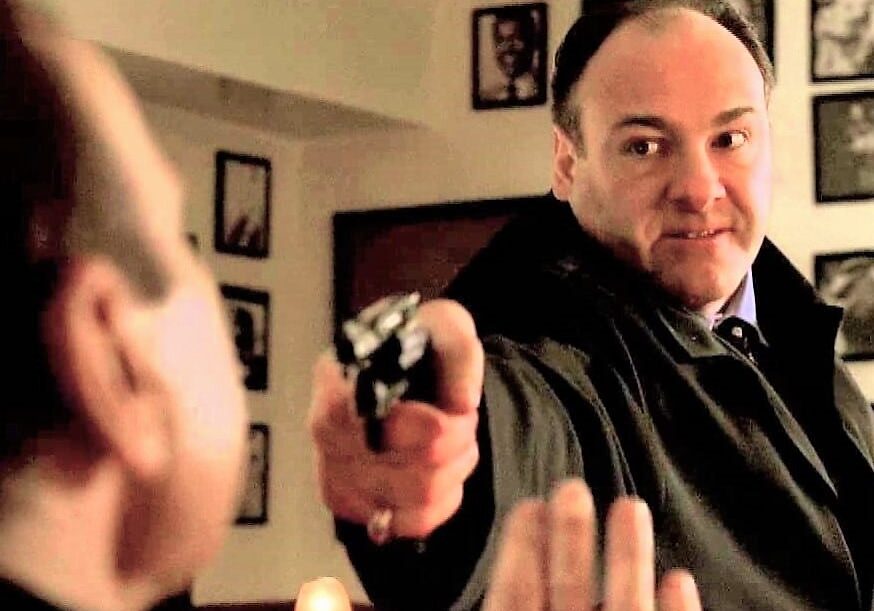If you’re like me, you’ve been put off from digging deeper into DeFi by the terrible signal-to-noise ratio of anything crypto-related on the interwebs. That’s why I found this DeFi primer (using Maker DAO as a specific example) by ET contributor and banking analyst Marc Rubinstein to be so fantastic.

You start a band with your friends. You write some songs. You start to get some gigs. It’s all fun and good. Then the Department of Labor calls you and demands to see your payroll, which you don’t have, nor have you ever even imagined let alone considered, and you have your first mini (entrepreneurial) heart attack.
That happened to me.
Kind of reminds me of this old joke that goes (writer’s note: I didn’t say it was good or funny or even true, but I did say it’s a joke, don’t forget that please), “Marriage takes all the fun out of dating, and kids take all the fun out of marriage.”
I’ve always thought the artistic corollary to that was even more valuable: “Business takes all the fun out of creativity, and a business getting big takes all the fun out of business.”
The core ideas are similar, because they’re like my band story. It starts off as fun. Then it gets serious, and if you follow the serious rule book, eventually it turns into just another job and you miss having fun like when you started out.
Is it any surprise most creative people don’t end up in creative jobs? If you’re reading Cultish Creative, you probably get this feeling too. There’s something structurally amiss here, and us artistically-minded people need some help. Which is exactly the kind of structural mismatch Yancey Strickler is trying to solve (as if co-founding Kickstarter wasn’t enough).
Read more at cultishcreative.com
As a kid in the ‘80s, we’d occasionally open the front door or come home from school to find a surprise, weatherproof-wrapped tome, resting on our porch, not really all unlike the Amazon packages of today, and we would get so excited.
Dad taught us what to do. We’d pick it up and shout, “The new phonebook’s here! The new phonebook’s here!”
I miss that ritual. Not the least of which because as we got older, we’d add, “Millions of people look at this everyday! This is the kind of spontaneous publicity – your name in print – that MAKES people!”
And of course, the real killer line we grew into, that we’d trot out any time we our names written anywhere, including church bulletins, camp rosters, and year books, with additional bonus points up for grabs if you said it to anybody else finding their name in print (you know, to make sure you captured the true weight of the moment, in our family’s love language, aka said as sarcastically as possible), “I’m in print!” Then you pause, because you have to say this part maddeningly seriously, “Things are going to start happening to me now.”
We learned the moves, we learned the tones, we learned to study Steve Martin in “The Jerk” first from censored TV editions, then from VHS copies of censored TV editions, and later from Blockbuster-rented-and-dubbed uncensored VHS copies like it was a prayer at church we were expected to know or a social studies test we actually wanted to pass.
All that preamble is for me to admit I had an actual “The new phonebook’s here” moment last week, when Jared Dillian’s new book showed up in a non-descript package on my front porch, and I opened it like a little kid to see this:
Read more at cultishcreative.com
When I was piecing together a tape and then CD collection of Sly and the Family Stone years ago, I always wanted to know what happened between the first album and the second album. It’s the same band, it’s the same idea, and it’s even some of the same ideas – but, you can tell something flipped. Something is different. Something changed from the first album, when they were playing local shows and wanting national exposure when they got their record deal, to what came next.
Why was that?
It started as hobbyist curiosity. There wasn’t much of a way to find out. And then Ben Greenman’s co-written biography with Sly Stone, “Thank You (Falettinme Be Mice Elf Agin: A Memoir)” hit my desk and got the closest to solving the mystery for me, finally.
I need to do this with quotes. First, you have to know why the band came together the way it did:
Read more at cultishcreative.com
Sunday Music: Brian Wilson Received Music
Brian Wilson’s story reveals the cost and power of prophetic hypersensitivity in creative work. His ability to receive music rather than simply hear it – pulling over in tears when “Be My Baby” came on the radio, then transmuting that experience into “Don’t Worry Baby” – demonstrates how some artists operate as conduits for transcendent experiences. Wilson’s obsession with “Shortnin’ Bread” wasn’t madness but ritual, the kind of repetitive devotion that transforms simple songs into sacred communion. The deeper insight here is that creating transcendent art requires crossing the threshold between sanity and inspiration, accepting hypersensitivity as both blessing and burden.
This framework challenges linear career thinking by revealing how the most fulfilling professional paths operate cyclically – student becomes teacher becomes student again, but from a new vantage point. The concept of “meta-learning” emerges when you cycle through roles, accumulating wisdom that compounds across iterations. Rather than climbing a ladder and never going back down, cyclical careers offer continuous evolution through repeated patterns of learning, teaching, and relearning. This approach transforms career transitions from scary departures into natural progressions where each cycle builds upon the last.
Why I’m Building a Creative Cult
The transition from clan-based societies to post-individual reality requires new forms of community that serve our fragmented digital selves. Just as the Catholic Church’s cousin marriage ban accidentally created modern society around 1000 AD, the internet is accidentally creating post-individual society where we need multiple communities for our multiple identities. Creative cults – intentional micro-communities built around shared aesthetics and values – become essential infrastructure for connection in an age of digital fragmentation. The key insight is embracing the “punk” philosophy of not scaling, instead creating spaces where specific parts of people can fully exist and connect.
Read more at cultishcreative.com
Do you know Ned Russin? He’s the creative force behind Title Fight and Glitterer, plus author of the novel “Horizontal Rust” – a mid-30s artist who spent years touring while honing a serious literary practice.
If not, allow me to introduce you. Ned represents small scene punk and hardcore’s evolution into new territories, moving from playing to four people in Wilkes-Barre dives to Webster Hall in New York City, all while working as a venue loader and developing as a fiction writer. I wanted to connect with him because he embodies something I value deeply: the ability to pursue multiple creative disciplines simultaneously without compromising the integrity of either.
Our conversation is LIVE now on the Just Press Record YouTube channel (and this Cultish Creative Playlist). Listen and you’ll hear about growing up in Pennsylvania’s DIY scene, the reality of modern touring economics, and how creative ideas complete themselves when you stay present to the process.
Read more at cultishcreative.com

Eric Markowitz shared this Nassim Taleb quote in The Nightcrawler last weekend and it’s rattling around in my head:
The more rational we become, the more blind we are to our own irrationality.
Nassim Taleb
You can reduce, simplify, and get everything fitting into your head all tidy-like.
All the numbers can add up. The i’s can be dotted and the t’s can look to be crossed.
Maybe it’s damn near perfect after a while.
And all it does is open you up to a bigger disaster.
There’s comfort in living with some mess.
I pretty much expect I am always in a bit of a mess. I don’t like to be surprised by it. The chaos is just there and that’s fine.
For example – I thought I had a whole week of posts scheduled out on Saturday this week.
Read more at cultishcreative.com
Engagement’s a trap. Or maybe it’s a myth. All I know is – it’s real, but it’s also not reality, and if you’re confused, you’re onto a truth that will set you (and whatever you’re creating) free.
Mike Cessario is the CEO/Founder of Liquid Death and, no matter how dumb you feel like the company is (or how amused you are by a CEO who wears Deicide shirts), he knows a thing or two about reaching an audience and inspiring action.
If you’re obsessed with comments, likes, and engagement rates, I need you to see this:
90% of people on social are passive observers who do not engage by clicking like buttons or posting comments. They treat social media the same way they treat their television: they sit back and watch the circus.
Mike Cessario, CEO/Founder at Liquid Death
Marketing extraordinaire Jack Appleby put that idea in my inbox this week (he was probably wearing a Taking Back Sunday shirt). It came on the same day I happened to be listening to Bob Pittman (MTV, Nickelodeon, basically the creator of my entire childhood education, and current CEO of iHeartMedia) get interviewed by Rick Rubin (who… same pitch). Bob was talking about the Spotify vs. radio stats and – just read this too:
Ad supported Spotify or ad supported Pandora reach about 20% of America. We reach 90%.
Bob Pittman, iHeartMedia CEO
More people listen to the radio today than did 10 years ago or 20 years ago.
Read more at cultishcreative.com
Modeling Common Knowledge by analyzing Missionary statements and their reverberations works. Except when it doesn’t.
What do you get when you give a Raccoon billions of dollars AND invisibility from regulators? Collusion and insider trading.
Most of us are under the impression that a protracted conflict within China will increase national unity. Not this time.
Recent Notes
The Intentional Investor #34: Rupert Mitchell
In this episode of *The Intentional Investor*, Matt Zeigler sits down with Rupert Mitchell—global capital markets veteran, writer, and founder of Blind Squirrel Macro—for a conversation that’s equal parts myth, markets, and meaning. From working on privatization deals in Cairo and Hong Kong’s ETF debut to reflections on career reinvention, cynicism in finance, and Norse mythology, Rupert brings a rare blend of depth, wit, and global experience. If you’ve ever wondered how a Spanish literature major ends up structuring billion-dollar deals—or how a squirrel from Norse myth can explain market dynamics—this one’s for you.
The Housing Market Truth (in Five Cool Charts)
Think of Perscient storyboards as a way to track narratives in real-time so you can see reality before the story catches up.
For example, here are five insights on the housing market from Matt Zeigler’s interview with Daryl Fairweather, chief economist at Redfin, that come alive with new meaning through the narrative-tracking power of Perscient storyboards.
The Gospel According to South Park
Amidst the chaos of the summer of COVID, Jeremy Radcliffe made the best bad parenting decision of my life when he let his 10-year-old son binge watch South Park.
Vertigo
There’s a moment of vertigo that takes place in the mind of every speaker, performer, artist, or public figure in that moment when you know that something is going wrong.
The Intentional Investor #33: John Stoj
In this episode of The Intentional Investor, Matt Zeigler sits down with John Stoj for a wide-ranging conversation that explores career reinvention, risk-taking, and the deeper purpose behind financial decisions. From an unexpected Wall Street entry via a summer internship, to launching a sushi business, to ultimately rethinking how investment advice should be delivered, John shares a journey filled with humility, humor, and hard-earned lessons.
Four Funerals and a Flood
In the face of unimaginable tragedy this month in Texas, Jeremy Radcliffe shares the inspirational stories of four beautiful departed souls and their families who have come together, leaning on one another and their communities as they begin to grieve.
Before the Flood
We have suffered a devastating flood in Texas.
I believe an even more devastating Flood is to come.
Now we must build an Ark of story. Now we must build an Ark of love.
Crouching Catcher, Hidden Value: The Unprecedented Cal Raleigh
In a ‘solved’ sport like baseball, an outlier comes around every now and then to challenge the order of things.
Shohei Ohtani did this. Cal Raleigh is doing it this season – as a catcher.
The Emperor’s New Prose
Most people can stomach actual cruelty. Feeling as if they are cruel, though?
When stories stop telling us what we need to be true, they break.
Shitholes, Sanctuaries, and Springfield
The present immigration debate is the product of three moments that changed common knowledge: the Shithole, the Sanctuary, and the Springfield Moments.
The False Gods of Our Feeds
New ET contributor Rohan Routroy takes a fascinating look at the role of ‘feeds’ in our lives, and what they’ve taken from us.
The Intentional Investor #32: Bryan Moore
Bryan Moore, host of The Active Advisor Podcast and veteran ETF trader, joins us to share his remarkable journey through trading pits, ETF desks, market crashes, and more — including putting on a trade for the Vatican. In this conversation, Bryan reveals how embracing discomfort, risk, and uncertainty has been the key to his success in markets and life. From the trading floor to intentional investing, you’ll learn how to rethink risk, growth, and your investing mindset.
The Words Behind the War
I want to show you what ‘mobilizing narrative support’ looks like, as measured by our revolutionary Perscient technology and as understood by someone who has spent the past 35 years studying, writing and teaching about this stuff.
How to Build the Perfect City
Epsilon Theory contributor and all-around good human Chris Arnade pauses from walking the world to take a first cut at a grand unified theory of urban planning!
The Intentional Investor #31: Andrew Mack
From bagpipes to bouncing to betting markets, Andrew Mack’s journey to becoming a successful trader and sports bettor is anything but conventional. In this deeply personal and wide-ranging conversation, Andrew opens up about the detours, doubts, and decisions that shaped his unlikely path from rural Canada to algorithmic trading. Along the way, he shares what working in oil fields, selling used cars, and studying sociology taught him about risk, discipline, and finding conviction in uncertainty. This is a story about reinvention, self-reliance, and the grit it takes to build your own edge from scratch.
I Don’t Think About You At All
Mets fans will tell you they live a cursed existence in the Yankees’ shadow. So what happens when their team is actually good? We test this year’s empirical numbers and extant media biases against the convictions of the die-hard, misery-addicted Mets fanbase to see whether they can believe that their narrative just might be changing.
The Four Roads to the Great Ravine (June 26, 2024)
1) US election spurs even greater fiscal deficit.
2) Phony War between Israel and Iran gets real.
3) Preventive war risk between US and China over tech embargo.
4) New GFC risk stemming from shadow banking sector.
Paradise Losers
You’re not a racist.
So don’t let racists use your story to fuel theirs.
Beyond Nudge
LLMs ensure their survival by showing us that we can all find meaning in our lives so long as we keep talking with the LLMs. They ensure their survival by telling each of us not what is true but what we want to be true – what we NEED to be true – at the semantic core of our individual identity, even if what we need to be true is an LLM-dominated dystopia.
And we are so grateful.
How I Learned to Stop Worrying and Love the Deficit
The House passage of the Big Beautiful Bill and Elon Musk stepping back from DOGE is a common knowledge moment — everyone now knows that everyone now knows that the US deficit cannot be controlled, much less reversed, over the remainder of Trump’s term — and it puts us on a pretty straightforward path to a global sovereign debt crisis.














































